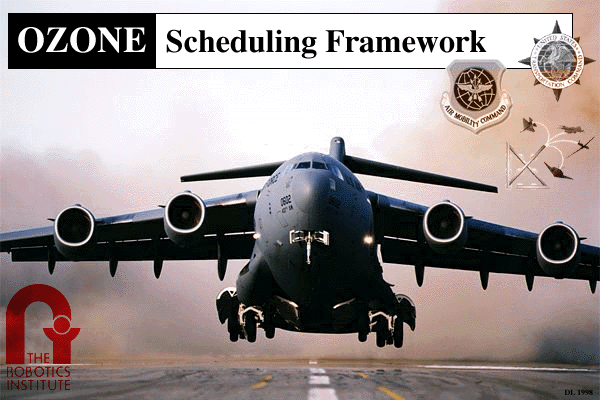
Configurable, Mixed-Initiative Scheduling Systems
The OZONE/DITOPS Project
Project Goals
This research builds from our previous work in constraint-based scheduling
and focuses on two key obstacles to the development and application of
intelligent systems in large-scale planning and scheduling domains such
as manufacturing management and crisis-action logisitics planning:
-
Current systems to not effectively support user tasks and requirements
- They force users to operate on their terms, provide no guidance in understanding,
diagnosing and improving results, and do not support the iterative, evolving
process of problem understanding, requirements determination, conflict
resolution and solution refinement that is inherent in large-scale, multi-agent
problem solving.
-
Current application building efforts are difficult, costly and time consuming
tasks. The power of knowledge-based planning and scheduling technologies,
i.e., their ability to encode and productively exploit high-fidelity models
of the target environment and domain-specific heuristics, is also their
"Achilles' heel" from a system development perspective.
Approach
We are developing theories, techniques and software architectures that
address these problems, enabling both flexible collaborative problem solving
between user and system, and flexible reconfiguration of system functionality
to accommodate new domains and/or domain requirements. Our approach to
mixed-initiative systems properly recognizes scheduling for what it is
in most practical domains: an iterative process of "getting the constraints
right" in which humans always have strategic, big-picture decision-making
expertise and knowledge to contribute but are unable to effectively cope
with the complexity of detailed solution development. We are developing
a collaborative scheduling framework based on this process viewpoint, where
the user visualizes and manipulates solutions from comprehensible, aggregate
perspectives, and the system incrementally manages the details of user
changes in accordance with communicated goals and expectations. Our approach
to scheduling system architecture builds from object technology concepts.
We are developing a general "ontology" of scheduling concepts to enable
application in different domains and allow integration with other, complementary
problem solving and information processing services. Our broader goal is
a planning and scheduling "tool box", an application construction environment
which couples a system configuration infra-structure with expandable libraries
of functional componentry.
Application Context and Software Technologies
The dominant application focus of this work, funded under the ARPA/Rome
Laboratories Planning Initiative, is military crisis-action deployment
scheduling. This has led to development of the DITOPS
scheduling system. DITOPS combines the use of hierarchical domain models
and solution visualizations with reactive, constraint-based scheduling
techniques to provide advanced capabilities for generating, analyzing,
manipulating and improving deployment schedules. At the same time, DITOPS
has been designed for reconfigurability; the supporting OZONE scheduling
infra-structure provides a rich class library of modeling and scheduling
services that make the system readily applicable to other problem domains.
General Information
Researchers
Stephen F. Smith
Marcel Becker
Recent Publications
-
S.F. Smith, O. Lassila and M. Becker, Configurable,
Mixed-Initiative Systems for Planning and Scheduling, in Advanced
Planning Technology, (ed. A. Tate), AAAI Press, Menlo Park, CA, May, 1996.
-
M. Becker, and S.F. Smith, "Using
DITOPS as a Tool for Mixed-Initiative Schedule Improvement" (This
is a TAR file with the gzipped version of the paper. The post-script file
has been split into 6 parts because of its size. Download the file, 1M,
untar with "tar xvf ditops-demo.tar", goto the compressed directory, "gunzip
ditops-demo-ps*").
-
Smith, S.F. and M. Becker, "An
Ontology for Constructing Scheduling Systems", to appear in Working
Notes of 1997 AAAI Symposium on Ontological Engineering, Stanford,
CA, March, 1997 (AAAI Press).
-
O. Lassila, M. Becker and S.F. Smith, "An
Exploratory Prototype for Air Medical Evacuation Re-Planning", CMU
Robotics Institute Technical Report CMU-RI-TR-96-03, January, 1996.
-
S.F. Smith, "Reactive
Scheduling Systems", in Intelligent Scheduling Systems, (eds.
Brown & Scherer), Kluwer Publishing, 1995.
-
M. Burstien, R. Shantz, M. Bienkowski, M.desJardin and S.F. Smith, "The
Arpa/Rome Laboratory Common Prototyping Environment: A Framework for Software
Technology Integration, Evaluation and Transition", IEEE Expert,
Vol. 10, No. 1, February 1995.
-
S.F.Smith and O.Lassila, Toward
the Development of Mixed-Initiative Scheduling systems, ARPA-Rome
Laboratory Planning Initiative Workshop, Tucson (AZ), 1994.
-
O.Lassila and S.F.Smith, Constructing
Flexible Scheduling Systems for Decision Support, Proceedings 1994
Finnish AI Symposium, Turku (Finland), August 1994.
-
O.Lassila and S.F.Smith, Flexible,
Constraint-Based Tools for Complex Scheduling Applications, IEEE
4th Annual Dual-Use Technologies & Applications Conference, Utica (NY),
1994.
-
S.F. Smith, O. Lassila and M. Becker, "Configurable Planning and Scheduling
Systems", AI*IA Notizie (Quarterly Publication of the Artificial Intelligence
Italian Association), Special Issue on Aspects of Planning Research,
Vol.9, No. 1, March, 1996, pp. 27-32.
-
S.F. Smith, O. Lassila and M. Becker, "A Scheduling Ontology: Informal
Concept Descriptions", ICLL Working Paper, January, 1996.
-
S.F.Smith and O.Lassila, Configurable
Systems for Reactive Production Management, IFIP Transactions B-15,
Elsevier Science B.V., 1994.
-
S.F.Smith and K.P. Sycara, Flexible
Coordination in Resource-Constrained Domains, Technical Report CMU-RI-TR-93-17,
The Robotics Institute, Carnegie Mellon University, December, 1993.
Jump to --> ICL Lab home page
Stephen F. Smith <sfs@cs.cmu.edu>